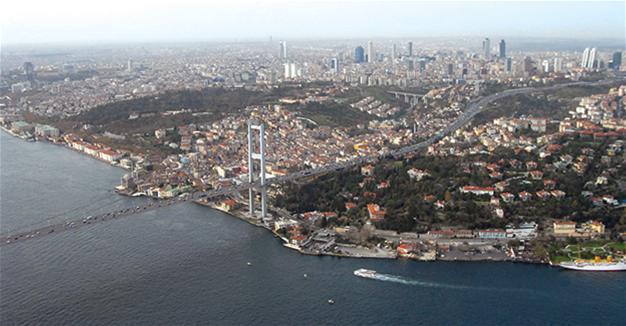5 presidents to attend key economic summit in Istanbul
ISTANBUL
 Some 40 countries and five presidents will attend the 20th Eurasian Economic Summit, a prestigious gathering organized by The Marmara Group Foundation in international arena. The summit ‘Humanity at a Crossroads’ will be held between April 4 and 6 in Istanbul
Some 40 countries and five presidents will attend the 20th Eurasian Economic Summit, a prestigious gathering organized by The Marmara Group Foundation in international arena. The summit ‘Humanity at a Crossroads’ will be held between April 4 and 6 in Istanbul The presidents of Albania, Montenegro, Bosnia Herzegovina, Turkish Cyprus and Macedonia are expected to attend the 20th Eurasian Economic Summit in Istanbul between April 4 and 6, which is being organized by The Marmara Group Foundation.
The summit will host Albanian President Bushar Nishani, Montenegrin President Filip Vujanovic, Bosnian President Mladen Ivanic, Turkish Cypriot President Mustafa Akıncı and Macedonian President Gjorge Ivanov.
Former presidents of Croatia, Latvia, Moldova, Nigeria, Romania and Serbia will also attend the summit’s “Contemporary Sagacious Men” session.
The European Parliament, United Nations, Organization of Islamic Cooperation, European Bank for Reconstruction and Development (EBRD), Vienna Economic Forum, Academy of Sciences of Moldova, The Slavyani Foundation and Slovenia Life Learning Academy have said they will attend the summit too, where Azerbaijan, Afghanistan, Bosnia Herzegovina, Morocco, Kosovo and Romania will also attend on a ministerial level as well.
“The 20th of the Eurasian Economic Summit, which is organized by The Marmara Group Foundation that I preside, will be held between April 4 and 6 in Istanbul. As you would appreciate, it is not easy to carry on this organization successfully continuously as a civil initiative. My colleagues and I carry over this magnificent success with determination and attention annually,” said Akkan Suver, the president of The Marmara Group Foundation.
“This year, we will bring the future of the EU to discussion in the 20th Eurasian Economic Summit, which will host the presidents of Macedonia, Montenegro, Bosnia Herzegovina, Albania and Turkish Cyprus,” he said.
Suver said the world has been undergoing a huge political quake that is currently swaying every society and every state in the world.
“The democratization process defined by Samuel P. Huntington as the ‘Third Wave taking place between 1975 and 1985’ seems to have already expired. Instead, a wave of reverse authoritarianism has gone global. Recently, the votes of the movements and/or parties that find electoral support on the basis of populism, nativism and xenophobia have skyrocketed. Following the political triumph of Donald J. Trump, the lurching of Europe to the far right over Marine Le Pen’s National Front [FN] in France, Geert Wilders’ Party for Freedom in Netherlands, Alternative for Germany [AfD] in Germany and Freedom Party of Austria in Austria have created – nolens volens – a disquieting situation in the global conjuncture,” he added.
This question seems to be one that will be of growing concern in the years ahead, according to Suver.
“As a consequence, the genesis of the idea of European Union was reposed on the basic concerns of the statesmen such as Schubert and Monnet that may impede a probable re-emergence of warfare. In this context, the territorial borders within the European Union have been trivialized to preclude the re-destruction of Europe by wars and the attempts arising from the nationalistic streams that may cause warfare. We are obliged to question a Europe – which has been threatened by dissolution owing to the recent development of nationalistic streams – that maintains a policy laying emphasis on national states, sovereignty based on territory, and a Europe that refers enemy perception by making use of ethnic and religious identities, and a Europe that may drive the whole continent of Europe and the world to the Third World War,” he said.
He said that it was a matter of fact that a new process has already been underway for the EU.
“It is a fact; a new day era is beginning for the EU. Where will Britain’s exit take Europe? Will there be new departures from the union? Will there be changes to the institutional structure of the EU? We will approach these questions with the aspects of economy, energy and increasing migration. We will also try to get the answers of all these questions with politicians, academics and the leaders of civil society from different countries in 20th Eurasian Economic Summit,” Suver said.
















